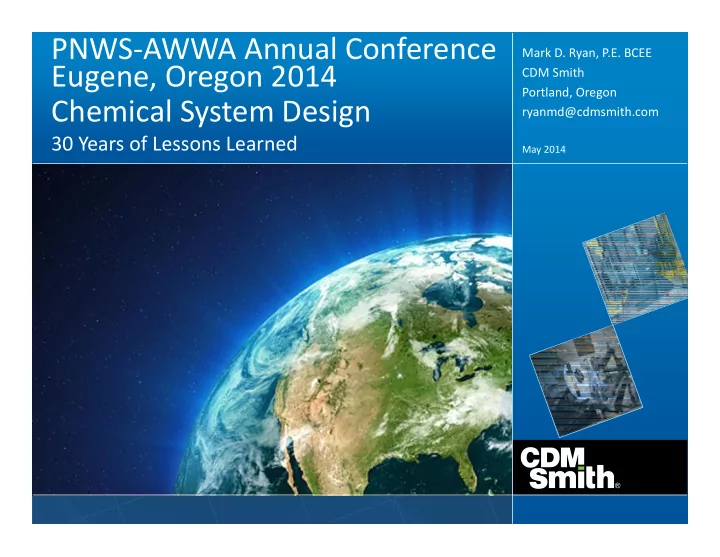

PNWS ‐ AWWA Annual Conference Mark D. Ryan, P.E. BCEE Eugene, Oregon 2014 CDM Smith Portland, Oregon Chemical System Design ryanmd@cdmsmith.com 30 Years of Lessons Learned May 2014
CHEMICAL SYSTEM PROBLEMS AND HOW TO AVOID THEM
Level of Complexity Does Not Fit Users’ Needs Right level of complexity? Start with an understanding of: Users’ objectives • Operating procedures • Control approach • Level of redundancy • Available space • Seek simplicity whenever possible. 2014 PNWS ‐ AWWA Annual Conference, Eugene OR
Failure to Appreciate Chemical’s Unique Features Chemical’s unique properties? How to gain a understanding: Talk with users’ O&M staff • Research AWWA material • Evaluate others’ designs • Talk with suppliers • Understand suppliers’ differences • Look at various forms of the • chemical Understand safety concerns • Each chemical has unique properties and products are different. 2014 PNWS ‐ AWWA Annual Conference, Eugene OR
Equipment is Difficult to Maintain Maintenance is essential to safety and continued operation. Creating good maintenance: Design with adequate clearances • Set at workable height • Ancillary systems for maintenance • (lighting, power, air, etc.) System disassembly • Replaceable parts and piping • Connections for drain/testing • Limits of skid mounting • No matter how good the system, maintenance must happen. 2014 PNWS ‐ AWWA Annual Conference, Eugene OR
Single Point System Failure Will a single failure shutdown the system and plant? Must understand: Importance of chemical in process • Need for divided power supply • Backup control features • Spare parts, shelf ‐ spare • Redundant piping or time to • install new Are building systems a risk? • Failure happens, understand implications and plan accordingly. 2014 PNWS ‐ AWWA Annual Conference, Eugene OR
Hydraulic Problems will Limit System’s Effectiveness Chemical systems have many hydraulic systems. How to prevent problems: Understand the chemical • NPSHr vs. NPSHa • How equipment functions • How equipment will be used • Gas buildup? • Potential for siphoning? • There is no replacement for hydraulic calculations and checking. 2014 PNWS ‐ AWWA Annual Conference, Eugene OR
Failure to Meet Flowrate Needs Low flow and unique situations cause capacity problems. Features to understand: Dosages and plant flowrates • Abnormal water quality events • Startup and special operations • Dosage vs. trim • Equipment range limitations • Varying chemical concentration • Understand the treatment process and operations. 2014 PNWS ‐ AWWA Annual Conference, Eugene OR
Metering Equipment May Limit System’s Use All pieces of equipment in the system need to be evaluated. What to look at: Research the pumping options • Quoted range vs. actual range • Added equipment complexity may • add limitations Fit equipment to the chemical • VFDs need special attention • Flow meter range • Understand each piece of equipment’s limitations. 2014 PNWS ‐ AWWA Annual Conference, Eugene OR
Is the Supply of Chemical a Possible Weak Link? Risks and possible outage time? What do you need to look at: Are there various forms of the • chemical? Which is most available? How many local suppliers? • Supplier’s vulnerability • Supply volume vs. delivery time • Plant backup? • Process importance? • Natural disasters and freak storms happen, likely with increasing frequency. 2014 PNWS ‐ AWWA Annual Conference, Eugene OR
Truck Unloading Area is Primary Point of Possible Exposure to Personnel and Environment What are the risks? What do you need to know: Chemical properties and hazards • Operating policies and regulations • Supplier’s policies and equipment • Containment of possible spills • Creation of fumes and odors • How transfer completed • Chemical transfer posses the greatest risk of exposure. 2014 PNWS ‐ AWWA Annual Conference, Eugene OR
Failure of Materials within the System Material failure is a high risk! How to mitigate material failure: Understand chemical properties • Understand various forms of the • chemical that will be present Research each material’s • limitations Look at all materials in the system • and related facility systems Not all chemical comparison • charts are created equal Understand chemical properties and materials’ track record. 2014 PNWS ‐ AWWA Annual Conference, Eugene OR
Lack of Maintenance Creates Risks Preventative maintenance critical. What is needed: Design for maintenance • Be proactive with CMMS • Asset Management creates • adequate budget Good eO&M makes information • available Safety features can be maintained • and checked Procedures, policies and programs provide the safest system. 2014 PNWS ‐ AWWA Annual Conference, Eugene OR
Failure of the System May Involve the Building Systems Building Systems are important. Where are the problems: Single source of power and • emergency power source I&C complexities • Structure and secondary • containment HVAC – air flow, heating and • cooling Match supports and anchors • amongst all the disciplines Failure of the building systems can shutdown a chemical system. 2014 PNWS ‐ AWWA Annual Conference, Eugene OR
Poor Mixing or Distribution of Chemical in Process Without proper mixing – it may not work! Where are the problems: Inadequate dispersion and mixing • Injection too close to analytical • element Back mixing creates inefficient • chemical use Need for carriage and mixing • water Process water hydraulics • Proper injection and mixing critical. 2014 PNWS ‐ AWWA Annual Conference, Eugene OR
Questions? Mark D. Ryan, P.E., BCEE CDM Smith Portland, Oregon (503) 205 ‐ 7405 (Office) (503) 347 ‐ 3940 (Cell) ryanmd@cdmsmith.com 2014 PNWS ‐ AWWA Annual Conference, Eugene OR
Recommend
More recommend